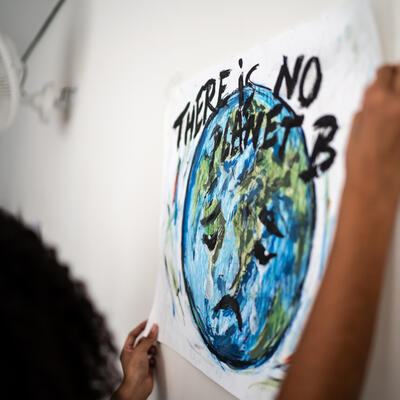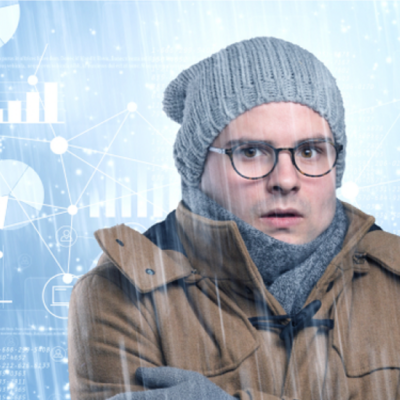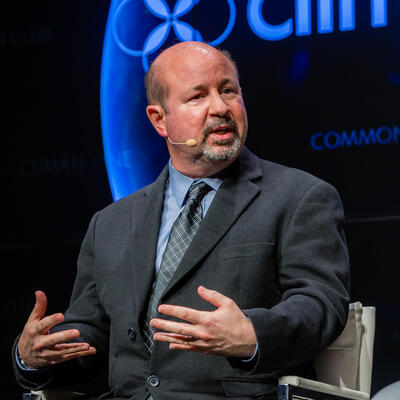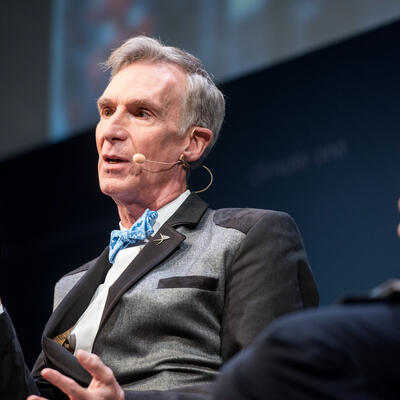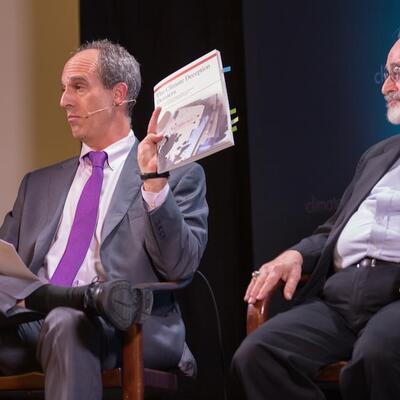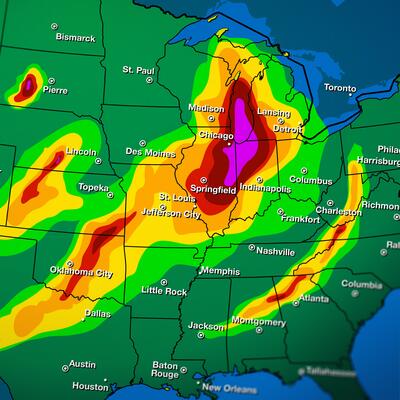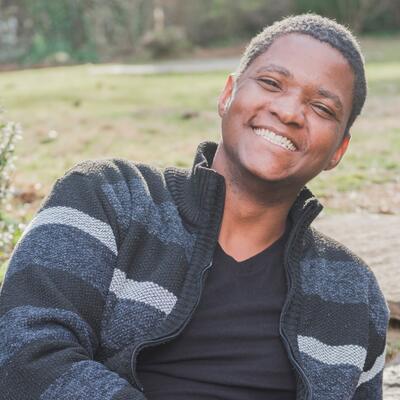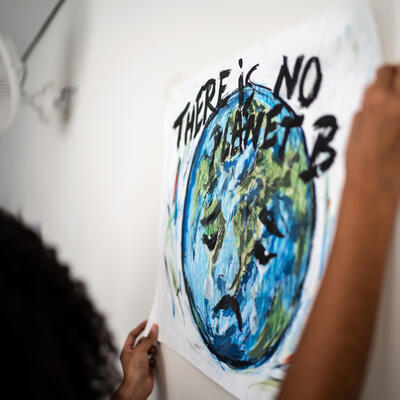
REWIND: Climate Miseducation
Guests
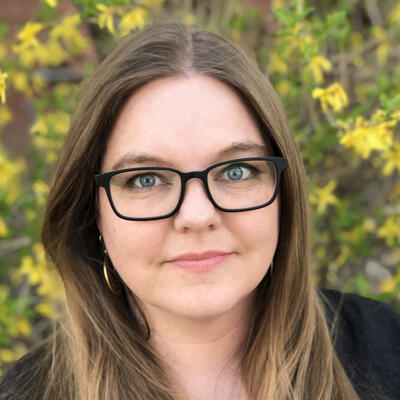
Katie Worth
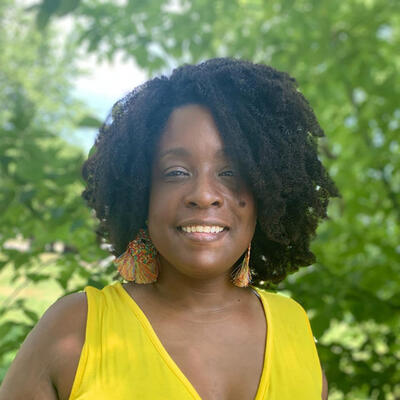
Lea Dotson
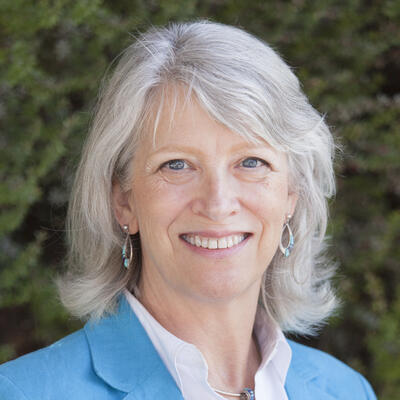
Ann Reid
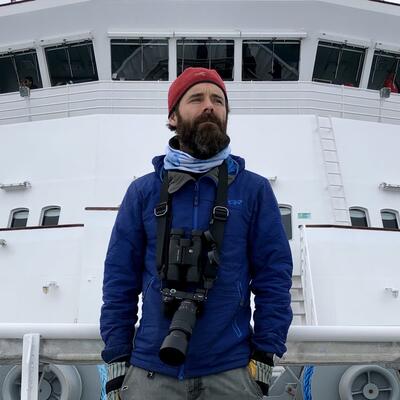
Ben Graves
Summary
Climate change science isn’t taught accurately — or equally — across the country.
Science standards and school curricula are always evolving, but the decentralized education system in the U.S. allows for widely different interpretations of teaching the same basic subjects.
In her book, Miseducation: How Climate Change is Taught in America, author and investigative journalist Katie Worth digs into how climate science is taught and who tries to influence it. She explores how, for decades, the oil and gas industry has worked to alter the narrative, following tactics used by the tobacco industry to sow distrust and doubt about climate science.
The influence of the fossil fuel industry continues in schools today, as Worth finds when she encounters an oil and gas lobbyist in Arkansas giving a classroom presentation to students that dismisses renewable energy sources as problematic.
“I did find a lot of examples of fossil fuel industry curricula and lesson plans and books,” Worth says. “Some of them are pretty blatantly anti-climate science and some of them are more subtle about it.”
But there are other influences on what students learn as well, which Worth says leads to unequal climate science education for students in different states.
“Lawmakers in blue states with blue-held legislatures have been pushing these measures that include climate science in the curriculum more rigorously and not just in science classes, but in civics classes and in English classes,” Worth says. “Meanwhile, in places like Idaho, with a very conservative legislature, there's been an ongoing fight for more than five years now about whether climate change should even be mentioned in the state’s academic standards.”
The National Center for Science Education has supported efforts at the local and state level to bolster science education and prevent attempts to block climate science from being taught. But NCSE Executive Director Ann Reid says a lot of climate education in the classroom also comes down to what teachers themselves know and understand about it.
“Many of them are not aware of the level of consensus and so they might portray to their students that there is not this nearly universal consensus among climate scientists about our impact on the climate,” she says. In addition, Reid says some teachers avoid teaching about climate because it’s viewed as a controversial issue. Her group provides materials to support teachers and help them improve their own understanding of the science.
Ben Graves understands this tension. He’s a former high school science teacher in rural Colorado where coal mining had been the economic base for decades. Though he provided clear-eyed information about the climate crisis, he says he tended to emphasize positive aspects of climate adaptation.
“How we are transforming industries to rely more on renewable energy, how our local electrical cooperative is buying locally-produced energy, capturing carbon from leaking coal mines,” Graves says. “I think that focusing on the doom and gloom and the projections of sea level rise was a hard way to inspire kids.”
In Ohio, Lea Dotson also works to inspire youth through her work at ACE — formerly the Alliance for Climate Education, now Action for the Climate Emergency.
“There are so many ways to educate our students that does not happen within classrooms. Social media, whether we like it or not, is an education vehicle,” Dotson says. Her group helps students organize around climate action and social and environmental justice, with a focus on civic engagement and building leaders for the next generation.
“I am floored all the time at how amazingly bright these students are,” Dotson says. “So, really giving them more agency to control the conversation because they are controlling this conversation in a lot of spaces and the way that they control it resonates.”
Related Links:
Miseducation: How Climate is Taught in America
National Center for Science Education
Action for the Climate Emergency
Full Transcript
Greg Dalton: This is Climate One. I’m Greg Dalton. Climate change science isn’t taught accurately--or equally--across the country. Some of that comes down to what teachers themselves know and understand about it.
Ann Reid: Many of them are not aware of the level of consensus and so they might portray to their students that there is not this nearly universal consensus among climate scientists about our impact on the climate.
Greg Dalton: In some cases, there’s undue influence by politicians or the fossil fuel industry:
Katie Worth: There's a ton of these curricula, some of them are pretty blatantly anti-climate science and some of them are more subtle about it.
Greg Dalton: To counter this, some are working to reach and motivate students around climate on a different level.
Lea Dotson: There are so many ways to educate our students that does not happen within classrooms. Social media, whether we like it or not, is an education vehicle.
Greg Dalton: This is Climate One, I’m Greg Dalton. Take a minute to think back to your middle and high school days. What do you remember learning about the science of climate disruption and the growing climate crisis? What you learned was probably somewhat dependent on where you grew up, and who your teachers were. Science standards and school curricula are always evolving, but the decentralized education system in the U.S. allows for widely different interpretations of teaching the same basic subjects. In her book, Miseducation: How Climate Change is Taught in America, author and investigative journalist Katie Worth dug into how climate science is taught and who tries to influence it. One primary focus is how much the oil and gas industry has worked to alter the narrative, following tactics used by the tobacco industry to sow distrust and doubt about climate science. And they’ve been doing it for decades. Katie Worth relates the history of one American Petroleum Institute memo thirty years ago that laid out plans to target school teachers and students with anti-climate campaigns.
Katie Worth: In the 1990s there's a real concerted push by the fossil fuel industry to kind of encourage doubt about climate science because a doubtful public was one that would not back major policy change, right? And the fossil fuel industry was worried about major policy change that would undermine their profits. So, the fossil fuel industry had been meeting for a long time, under the auspices of this group called the Global Climate Coalition. I think that's kind of an inspired piece of doublespeak because truly, what they were doing was trying to promote doubt about climate. And at one point they met with a group of executives from Exxon and Chevron and then some think tanks, some conservative think tanks and the American Petroleum Institute met to discuss what to do next. It was a communications action plan that they were after and it was a lot of like let’s find some scientists who are willing to say what we believe or who are saying what we believe and we’ll promote them and we’ll get them out in front of TV cameras. And we’re gonna also send all of this information to you know to politicians and we’re gonna persuade them to support our cause. And one of the strategies or one of the tactics that they discussed was getting into schools. So, you know, they've said that you know we want students and teachers to “understand” the problems with climate change science. And they were gonna work with the National Science Teachers Association with this, they were gonna send out materials to teachers. And you know it was all laid out in this memo that then got leaked to the New York Times. And as soon as it was leaked to the New York Times, the people involved were like, oh, this was just a brainstorming session, it wasn't actually gonna happen, we didn't have any intention to actually execute it. And they kind of went quiet, this particular group. But what we know is that the American Petroleum Institute did reach out to the National Science Teachers Association and they had several meetings with them and the National Science Teachers Association put up a website that had links to the Global Climate Coalition. You know, they also put out a series of videos that had you know like some real climate skeptical language in it. You know, whether or not it was part of the official action plan. They did execute some of the intentions that were laid out in that memo.
Greg Dalton: Right. And as you note in the book there’s a book, Naomi Oreskes and Erik Conway wrote kind of the real defining book on this called Merchants of Doubt and how they borrowed the playbook from tobacco companies who famously said doubt is our product. So, they’re playing the tobacco book and taking that into the classroom. Some of your reporting for this book started in the Marshall Islands. Why did you choose that place and how what you find there influence the book?
Katie Worth: Yeah, so we had a grant basically to do a story at Frontline had a grant to do a story about climate change. And so, my coworker producer Michelle Meissner and I started doing all this research. And one of the criteria that we had was we wanted to go somewhere where climate change was visible. It wasn't like this hypothetical futuristic thing that you know you had to imagine like we would be able to actually capture it on camera which of course like it’s more and more places fit that bill. But, you know, one of the places that it's most obvious is the Marshall Islands, which is very low-lying. The average elevation of those islands is like 10-feet above sea level. As sea levels rise, they’re gonna have more and more problems. And at some point, in the not distant future, possibly within our lifetimes it’s likely to become uninhabitable, the whole nation. So, that's the kind of you know we got interested in that and we got especially interested because the Marshall Islands has this history of being a site of nuclear testing. So, some of their islands have already been displaced by these powers that are greater than themselves, you know, by no cause of their own.
Greg Dalton: And what were they taught in school about climate?
Katie Worth: So, you know, we went there and we started talking to these kids and we were just stunned by how thoughtful and well-educated they were about climate change. Like these kids some of them could speak much more fluently than any most of the adults that I know. And, you know, and it’s because they learned about it in school every year pretty much, you know, and we sat through some lessons on climate change and the kids were volunteering the glaciers are melting and the waters are rising. They like knew all of this stuff before the teacher even said it. And so, one of the kids that we met there was this nine-year-old named Eiserman who knew tons about climate change and his family was actually thinking about moving to Oklahoma because they had extended family there, you know, they thought they might be able to find a job there and they wanted their kids to get a good education and they thought maybe they get a better education in Oklahoma than they could in the Marshall Islands. And so, the question immediately rose, okay well if they moved up to Oklahoma what will a nine-year-old Eiserman learn about climate change? And that was sort of the animating question underlying this book.
Greg Dalton: Interesting, yeah. It’s quite ironic to move from a country on the front lines of climate change to the oil patch to an oil-producing state in the United States. You recently participated in a podcast with Amy Westervelt of Drilled called the ABCs of Big Oil, which featured an excerpt you recorded of an oil and gas lobbyist delivering a presentation to middle school students in Arkansas. She basically rejected any renewable sources of energy and you write that the teacher didn’t push back on anything she said. Do you have an understanding why the teacher so passively received that information from a lobbyist in her classroom?
Katie Worth: Yeah, I mean, so the deal is that the oil and gas lobby in Arkansas has an employee whose job it is to go classroom to classroom and give presentations about geology and about the industry and it’s like she starts out by talking about all the jobs that are available on the oil and gas industry and how much you get paid. And then she has some legit info. It's a PowerPoint presentation she shows like kind of the layer cake of geology under our feet and where the oil and gas are and you know the technology that is used to extract it. And then she gets to the section that’s like there's a problem with fossil fuels and that's carbon emissions. But guess what, all of the other fuels also have a problem and there’s nothing really, we can do about it anyway and so just don't worry about it. And, yeah, the teacher didn't push back. She was very deferential to the guest. She was a guest that had been invited into her classroom. But as a result the kids also didn't question at all. And, you know, they just kind of took what she said and trusted it because it was happening in this kind of trusted place of education.
Greg Dalton: You mentioned that in the state of Arkansas the oil industry has a person who goes classroom to classroom. How common is this practice of lobbyists talking directly to students in that trusted classroom space?
Katie Worth: You know, I'm not sure I didn't find too many other examples of that though I did find a lot of examples of you know fossil fuel industry curricula and lesson plans and books showing up. Lots of companies offer field trips like come see our oil derrick and you'll learn about geology. And, you know, so there’s a ton of these curricula. Some of them are pretty blatantly anti-climate science and some of them are more subtle about it. So, there’s an agency in Oklahoma that they have put millions of dollars into creating curricula for kids and it’s funded by the state’s fossil fuel industry. And so, they have these books like Petro Pete’s Bad Dream that's meant for six-year-olds. And it’s a picture book in which this little boy wakes up one day and he finds that his toothbrush is missing and the tires on his bike are missing, and his clothes he can’t find his clothes. And like he goes through his day and it's all disrupted and it's terrible. And then finally his teacher figures out like, oh, I know what’s wrong you're missing all your petroleum products today. And Petro Pete says, oh no, not having petroleum products is a nightmare and then he wakes up and sure enough it was all that dream and his toothbrush is there and his clothes are there and like he can go about his beautiful life with all the petroleum products that he wants. And so, like these are you know this has been distributed to every first second-grade class in Oklahoma pretty much. And there have been hundreds of thousands of copies of books like that printed and distributed. And so, you know, that's like implanting in some really young minds this idea that petroleum products, the petroleum industry, is essential to our lives and without it, we will have a much harder time.
Greg Dalton: Well, isn’t that true that our home my home your home where we’re speaking now, this headset is made from oil. So, it is deeply embedded. I mean that's not wrong. And so, are you saying that the context is what the problem or that there's no alternative that we could make these products from alternative sources, you know, corn or something else. What’s wrong with presenting something that is factually true.
Katie Worth: You're absolutely right it is factually true. But that’s the point is that it’s like if suddenly we woke up to a world that had no petroleum products there are alternatives. And it’s the only telling half the story because petroleum products have been essential to the development of our world, but it's also essential to a major problem that is going to profoundly harm the world and create a lot of human suffering. So, to just say that you know like fossil fuels are essential to human well-being it’s not wrong that's not been wrong, but it's only telling half the story.
Greg Dalton: You’re listening to a Climate One conversation about how climate science is taught in the U.S. If you missed a previous episode, or want to hear more of Climate One’s empowering conversations, subscribe to our podcast wherever you get your pods. Coming up, how state politics create a two-tier system of climate education for students:
Katie Worth: What a kid learns about climate change, you know, can be very different if they grow up in Oklahoma or New Jersey.
Greg Dalton: This is Climate One. I’m Greg Dalton. Let’s get back to my conversation with Katie Worth, a former investigative journalist with Frontline and author of Miseducation: How Climate Change Is Taught in America. I asked her to explain why the state of Texas plays an outsized role in the content of the nation’s textbooks.
Katie Worth: More than 100 years ago there was a battle between southern states and textbook companies about how the Civil War was portrayed. And, you know, southern states and educators didn't like these northern interpretations of what the Civil War was about. But they created the system where the state would approve had to approve any textbook that would be used in schools. And northern states don't do that; they just leave it to the school districts to figure out what textbook to use. But these southern states and some of the western states as well have statewide adoptions which gives them incredible power over what is in these textbooks. And Texas has long been number one or number two purchaser of textbooks. And they’ve also exerted a lot of control over what they say. So, like for example, in the 1930s, maybe it was the 1920s the governor of Texas banned the mention of human evolution in the biology textbooks that would be given to Texan children. And that you know had this ripple effect across the country because of course the textbook company who create this textbook they’re not making 50 different textbooks for 50 different states. And so, what happens in Texas then you know ripples out and influences what kids are learning in Oklahoma and North Dakota in Massachusetts and Virginia in Michigan. So, just as evolution was determined by kind of people who had a real perspective on that, it wasn't consistent with the science there has been some pressure on textbook companies to be careful what they say about climate change and climate science. And so, you know, I looked through dozens of middle school science textbooks and read what they said about climate change. And what I found was that they mostly do talk about climate science and the greenhouse effect and like the legitimate science but they almost always include couched language. So, they'll say things like many scientists believe that the earth is warming, but some say that it's not.
Greg Dalton: False equivalence to false -- the balance bias and the false equivalence lives on that we’ve learned about in the media. You write it every year, lawmakers and states across the country propose bills that aim to influence how evolution and climate change are taught in science classes, as you just mentioned. Explain the role of the Christian right and pushing for alternative theories on evolution and how that affected teaching about climate change.
Katie Worth: There's really long and robust history of evangelicals pushing back against evolution education in schools. And for a long time, that's been like the hot button issue in science education: how is evolution taught to children. Their campaign hasn't been very successful because enshrined in our constitution is the separation of church and state, right. So, and every time that it comes to a court basically, the court says this is in violation to teach creationism in a science classroom or to prevent the teaching of evolution is a violation of the constitution. So, along comes this other “controversial” science topic, controversial I say in quotes because of course it’s not actually controversial among scientists, but it is among politicians. And so there's sort of a melding that happens of the evangelicals and the movement to diminish the teaching of climate change in classrooms, because they sort of like joined forces. And what the evangelical or the pro-creationist people get out of that is they’re saying like look it’s not just about evolution it’s about, you know, all kinds of political things in the classroom. And so, they kind of can distance themselves by advocating for both; they distance themselves from that attack from the protection of the constitution.
Greg Dalton: So, it’s quite an alliance. Well, this push goes in the other direction too: lots of organizations try to influence what's taught in classrooms, what gets into textbooks. In 2020 pro-climate education measures were introduced in 12 states. Explain how this divide creates a two-tier system. Kids in some states will learn the basic facts about climate while kids in other states will learn something very different as you’ve been describing.
Katie Worth: So, there is this big push among people who are concerned about climate change that they want their children to learn something about the phenomenon that will shape their lives, that is already shaping their lives truly and will sort of define the century that they were born into. And so, lawmakers in blue states with blue-held legislatures have been pushing these measures that include climate science in the curriculum more rigorously and not just in science classes, but in civics classes and in English classes. It can be incorporated in education in a number of places. Meanwhile, in places like Idaho with a very conservative legislature they have had to fight for years, there's been an ongoing fight for more than five years now about whether climate change should even be mentioned in the state’s academic standards. And so, these two forces, because this is a red-blue issue that the two parties feel quite differently about, then trickles down into the education of a red state or a blue state. And so, what a kid learns about climate change, you know, can be very different if they grow up in Oklahoma or New Jersey or Hawaii, you know, like it’s very good it has climate change all over their standards. But then that Hawaiian kid moves to Oklahoma, Arkansas, Texas, and that it is absolutely absent and that's an equity issue, right. Like, so, basically kids in some states are learning about this phenomenon that will impact their lives and kids in other states aren’t.
Greg Dalton: Well, that’s clearly another way that we're polarizing and dividing in this country instead of self-sorting into states where people look and think like us. So, help us understand what's at stake here. What are the ramifications of teaching children about climate change or not teaching them? What does that mean going forward in their lives?
Katie Worth: There's a few ways to look at this. One, is just, like do you believe that kids should have a right to understand the world that they're walking into? You know, a lot of people feel that climate science and kind of the issues around it is sort of like the right of kids to know because they have the most at stake, they have more at stake than any of us do, right. And they’re gonna be living with this phenomenon their whole life. And so, you know, they should learn a little bit about it in school. And, you know, so that is at stake of course, young people have been very much involved in pushing for action you know the Greta Thunbergs of the world, not just her but there's a whole movement of young people who have push for action and who have, you know, walked out of school and work and like trying to bring attention to this issue that needs attention, right. So, to do that they need to know something about the issue. And, you know, then it’s also, you know, for the kids who are taught like oh climate change is no big deal, don't worry about it, they are being misinformed. Because that's just not true it is a big deal and it will be a big deal in their life. So, what's at stake like they're basically being misinformed in their education.
Greg Dalton: So, after all this reporting, where do you find hope in what kids are learning about climate?
Katie Worth: We know that Gen Z and millennials, but especially Gen Z are more concerned about the climate than their elders. And despite not getting universally great education about this they're seeking out information and they care and they're willing they're more willing to accept drastic action on it than any generation that's older than them. And I know you're talking to folks at the Alliance for Climate Education and they have, they have an assembly program, and there is something really powerful about that because it’s sort of bypassing the you don’t have to change the state academic standards and the textbooks and the teachers’ minds and educate teachers about it like you’re getting to the students and then it kind of works backwards. So, the teachers then go to their science class and are like what happened tell me more about this phenomenon, you know. Those kinds of programs I think can be very powerful change agents in schools.
Greg Dalton: Katie Worth is a former investigative journalist with Frontline and she's author of Miseducation: How Climate Change Is Taught in America. Katie, thanks for sharing your journey through the classroom with us on Climate One.
Katie Worth: Yeah, you bet. I'm glad to be here.
Greg Dalton: Now let’s hear from those in the classrooms and working to combat misinformation around climate science. My next guests are Ann Reid, executive director of the National Center for Science Education; Lea Dotson, Ohio-based campaigner with the group formerly known as Alliance for Climate Education, now Action for the Climate Emergency; and Ben Graves, a former high school science teacher in rural western Colorado. The National Center for Science Education has done several national surveys of middle and high school teachers asking about teaching practices, including one on climate change about six years ago. Ann Reid says those surveys found that about half of the teachers were sending their students a mixed message about climate science.
Ann Reid: So, they might agree both with the statement that ‘I emphasize to my students that most scientists believe that humans are affecting our climate.’ And I emphasize a statement that says ‘many scientists don't think humans are affecting our climate.’ So, they are doing a little bit of bothsidesism in the classroom. And many of them are not aware of the level of consensus and so they might portray to their students that is not this nearly universal consensus among climate scientists about our impact on the climate. The good news is about 40% of the teachers were doing a good job in teaching climate change, and only about 8 to 10% were reporting that they were actively saying either climate is not changing or humans have no impact on it. The real problem was in this sort of mushy middle where the teachers, we believe, are using some kind of effort to keep conflict out of their classroom and they think that this kind of make it a debate is a way to avoid that kind of pushback.
Greg Dalton: Right, right. Interesting. Sort of self-censorship in a way of going on in the classroom because they don't wanna, it’s perceived to be a contentious issue. Ben, you live and work in a rural community where coal mining was the economic base for decades. That's changed in recent years. How has that local environment affected your teaching of science and climate to your students?
Ben Graves: Yeah, I think probably the biggest thing is that I tend to emphasize how we are positively affecting the global climate in the sense that like how we are transforming industries to rely more on renewable energy, how you know our local electrical cooperative is buying local energy locally produced energy, capturing carbon from leaking coal mines. So, really you know as much as climate was the focus of my teaching as a high school science teacher. I think that focusing on the doom and gloom and, you know, the projections of sea level rise was a hard way to inspire kids. And that was really what my task was, you know, is about creating lifelong learners rather than you know people better viewing there's no hope for humans.
Greg Dalton: What’s the hardest part of teaching climate science to your students?
Ben Graves: Working with colleagues who kind of viewed climate science as a continued debate and that's the way they like to portray it in their classroom. That’s challenging. You know that's a challenging thing to overcome because you may be doing one thing in your class, but you know, there may be multiple other science teachers in the school even in a small rural school where I taught there is, you know, other teachers that would teach other sections. And so, you know, that kind of conflict trying to keep things positive and keep things collegial is probably one of the more challenging things.
Greg Dalton: Lea, the founder of the Alliance for Climate Education is also I should say a supporter of Climate One and I’ve seen several of its school presentations over the years. It’s focused on educating and activating students, changing the narrative and connecting US and international youth. How do you do that in the classroom and outside?
Lea Dotson: So, before COVID hit we actually used to be inside of schools. We built relationships with building principals, classroom teachers to actually do actual presentations within the school as a supplement because the curriculum is not as robust dealing with authentic information around climate change. So, it was a call to action trying to get students involved as well as bring that into their learning space. Since COVID we have not been able to go into the schools but I'm a really big fan of popular education and really looking at education in ways that it is not prototypical but still where education happens. So, I really look at ACE in its new current form as really a form of popular education where we are not directly in the schools, but the information that we are giving out it filters its way in the schools by way of making leaders who then in turn go into the schools and lead their peers on a lot of the information that we talk about through ACE.
Greg Dalton: And ACE being the Alliance for Climate Education. We recently had a fascinating scientist Faith Kearns who wrote a book Getting to the Heart of Science Communication and it talks about trauma-informed communication. So, Lea, a lot of youth these days are pretty traumatized by what they think is a collapse of the world they’re growing up in. And so, how much do you pay attention to kind of scaring kids and traumatizing them by saying the math is bad, the science is dark. Does that come into what how you communicate with these kids and not send them into a dark hole by what you're telling them?
Lea Dotson: I think that's even a good segue into how we rebranded from Alliance for Climate Education to we rebranded for Action for Climate Emergency. So, that rebrand really speaks to how we in turn deal with that trauma and deal with that uncertainty because we feel that the best way to deal with the trauma is to be empowered in any situation where you feel that you don't have agency or you feel traumatized. The best way to break that is to feel like you do have agency and you are empowered to do something about it. So, we at Action for Climate Emergency that's exactly what we teach and develop our student leaders as advocates and empower them to have these conversations and grip that trauma that they may feel and move that into action.
Greg Dalton: So, action addresses despair, those sorts of things, interesting. Ann, how much is accurate science-based climate disruption actually taught in American schools?
Ann Reid: Our survey suggests that about 80% of biology teachers are teaching about climate change and we were surprised that about 30% of physics and chemistry teachers reported teaching about climate change, about 50% of middle school teachers. Now we now also from the survey that not all of those teachers are doing a great job at it. And there isn't really any way to know whether some students are getting accurate climate education starting in middle school and then moving through all of those different courses as they go through high school and how many students are just getting missed altogether. This is one of the really frustrating things about the American education system is that it is so decentralized and every state has its own set of science standards and then every district can implement those science standards in their own way. And so, it’s very, very possible for a lot of students to just miss out altogether.
Greg Dalton: Right. Lea, you spent some time as a school principal. How much control do teachers and administrators have over what's taught? And your thoughts on the flexibility, it’s part of the beauty and part of the problem of the American decentralized system.
Lea Dotson: I mean, that's exactly right. I absolutely concur with Ann that there's so much flexibility even within one district you have flexibility amongst buildings because it really does depend on leadership because the standards are written in a way where is really at the discretion of the building leadership and the teacher in general. We have toolkits and supplemental education here that that's exactly what the teachers were using Action for Climate Emergency for is to tap into some of our information so that they can teach around climate justice, but that's not across the board.
Greg Dalton: Ben, your thoughts on that.
Ben Graves: Yeah, I think something that I found I taught for quite a few years AP environmental science and AP biology. And those advanced placement courses because they do have a centralized assessment system that teachers are totally aware that if their students are gonna do well in these assessments they’re gonna need to know about climate change and they're going to need to know about current events related to climate change. And both of those courses have clear curricular ties, you know, to ecology and loss of biodiversity and energy systems. And so, you know I felt in all my courses I was you know it trickles down you know right and I hate to use that pejorative like it's going down. But if your AP courses are being held to a standard that the students need to be aware of current events related to the global climate system I'm able to do that in all my classes and I got a lot of good feedback and also positive support from my administrators, even despite you know having different political potentially even scientific beliefs on the subject. I said look, my students need to be competitive and this is gonna make them competitive and this is how I’m gonna teach and they respected that.
Greg Dalton: So, it sounds like that nationalized AP test might be one way that drives this, yet, Lea, there’s been a lot of reconsideration of nationalized standardized tests recently going back to no Child Left Behind and some colleges are now making ACT SATs optional because of lots of embedded bias in those privilege who gets to take those tests. Your thoughts on whether AP is a good thing for moving science education and climate or there might be some people who don't have access to those AP classes.
Lea Dotson: Yeah, I was just about to say as much of a fan of AP as I am, it is lacking in the fact that it is not addressing the whole. And there are ways to deal with that within the classroom. I mean all teachers have curriculum meetings, they have heads of departments where they actually discuss the curriculum amongst each other and amongst their peers as to what is taught into the department what is taught in the scope and sequence. So, even again, maybe it's just my lens as an administrator I just think it really falls on administration to putting your politics to the side and keep it with the facts. There are so many ways to educate our students that does not happen within classrooms. That even if it's not happening in a traditional classroom, what are some alternative ways in which we can get this information out. We use a lot of social media, social media, whether we like it or not, is an education vehicle. Utilizing in person after school clubs as a vehicle for education. So even where we are lacking in certain areas. I think it behooves us as educators to start thinking out the box.
Greg Dalton: Well, let’s pick up on that social media point. Ann, how do educators help students distinguish between sound science and all the misinformation they face every day on Instagram and other social media?
Ann Reid: Oh my gosh that’s such an important question. I kind of feel like if every student leaves high school knowing nothing more than that, nothing more than how to go and see whether a scientific claim is accurate or not that would be good enough for me.
Greg Dalton: Media literacy is taught in some schools now.
Ann Reid: Yeah. And actually in our curriculum that we've developed for teaching both evolution and climate change, and now since the pandemic we've developed a unit on the nature of science since it came pretty clear over the last 18 months, that there were a lot of people who didn't have a very good grasp on how science works. But in all of those we use some tools that have names that only an eighth grader could love the acronym for one of them is CRAAP, C-R-A-A-P that’s for evaluating the credibility of websites. There's another one called STINK. And then specifically helpful for climate change we use a rubric developed by John Cook, a climate communication researcher. His rubric is called FLICK and it helps students learn how to identify fallacious argumentation. So, they learn how to spot cherry picking. They learn how to spot pointing to fake experts. They learn how to identify conspiracy thinking. And these are the kinds of skills that you don't have to look very far on the Internet to find examples of all of those kinds of fallacious arguing, particularly around the issue of climate change and now vaccines and masks and all manner of other you know science communication that is designed to sow doubt or to misinform. So, we really push hard for teachers to teach their students those skills.
Greg Dalton: You're listening to a conversation about climate miseducation in the U.S. This is Climate One. Coming up, a teacher reflects on the challenges of finding common ground on climate science with parents and students.
Ben Graves: There are a lot of political and religious beliefs that do run counter to a lot of things that we’re teaching in the science classroom. That’s a hard conversation to have.
Greg Dalton: That’s up next, when Climate One continues.
Greg Dalton: This is Climate One. I’m Greg Dalton. We’re talking about climate miseducation with Lea Dotson, an Ohio-based campaigner with Action for Climate Emergency, Ann Reid, executive director of the National Center for Science Education, and Ben Graves, a former high school science teacher in rural Colorado. I asked Ben if he feels pressure from parents regarding what he teaches in the classroom.
Ben Graves: I used to tell people that if I felt the presence of a parent in the classroom that was usually a good thing because that means the parents are engaged with their education. And that's something that in my experience teaching in high need rural schools that was challenging, you know a lot of parents in our communities are working multiple jobs, they’re commuting long distances. You know, I live in in Colorado and a lot of our economies, you know now that a lot of the fossil fuel and extractive industries have really declined, now revolve around tourism. And we think of tourism as is this great green savior, but you know the reality is that requires families to travel hundreds of miles a day to seek jobs in some of the resort towns. So, yeah, like you know when I had engaged parents that gave me just the indication that education was really important to that family and so to try to find that common ground. A lot of times the common ground was about improving the economic realities for themselves. You know that's definitely something that regardless of party lines, regardless of views on science, a lot of families want to improve their economic standing. They want their children to have things that they did not have growing up or have access to things. And so, by changing the conversation around climate change to how do we improve forest health through a multitude of things that may include logging, but also includes carbon sequestration and includes recreation and tourism in all sorts of things like this. That's the common ground that I can find but there are a lot of political and religious beliefs that do run counter to a lot of things that we’re teaching in the science classroom. It’s a hard conversation to have.
Greg Dalton: Going up against faith and the old fossil fuel livelihoods and industry in Colorado must be challenging. Lea, the city of Cleveland has pledged to power the city with 100% renewable energy, yet, Ohio is a top user of coal. How does that context impact your work, talking to students about changing the way they power their homes and lives?
Lea Dotson: We just had that entire debacle with House Bill 6, which was like the biggest case of fraud in Ohio history where it’s like 60 million in kickbacks to the fossil fuel industry to kill a bill that guaranteed like subsidies for renewable energy. It was nuts so Ohio definitely has its issues and its share of bad press around it so you know here at Action for Climate Emergency we actually had the students testify to the commission on House Bill 6 around how it needed to be repealed what that meant. We had them talk to some of the legislators around not just being lip service. So, I think the best thing that we can do with our students is to make them aware and crystal clear about some of these hypocrisies because they are gonna be 18 and they’re gonna vote very, very soon. And we always push that like part of everything that we do is always keeping that lens of civic engagement civic organizing within the back burner because it ties in so heavy with a lot of the work that we do around educating around climate issues and environmental injustice. And really letting the students know that they are going to pick who is one to be on office one day and that they can use their influence to influence their peers and their family to also be aware and pick who is gonna be in these offices so that there is not these contradictions.
Greg Dalton: Ann, the National Center for Science Education has supported efforts at the local and state level to bolster science education and to prevent attempts to block climate science from being taught. What have been the biggest takeaways from those struggles?
Ann Reid: Well, I’m really glad you asked that. NCSE really got its start in evolution education and with battles all over the country to keep creationism out of the public school biology classroom. We did a survey similar to the climate change one on evolution back in 2008 and we found that only about 33% of high school biology teachers were teaching evolution in accordance with the accepted science which was a pretty sobering number. We repeated that survey a couple years ago and we found that that number had gone up to over 50% still not great that you know some 45% of biology teachers are not teaching the central core findings of biology accurately, but such a huge improvement. And we were quite surprised that one of the things that seemed to make the biggest difference was whether the state had adopted the next-generation science standards which cover evolution very well. That seemed to have had a ripple effect of teachers getting additional training in evolution teachers having that bolster of it's in the science standards I have to teach it and in case somebody had a problem with it that just made a really big difference in how well evolution was taught. So, it sounds kind of boring and bureaucratic but it turns out that just like Ben was saying about these topics being covered in national tests for all of the problems that national tests have when these topics are covered well in the science standards it really has an effect on how they’re taught in the schools. So, we spent a lot of time keeping our eye on state science standard renewals as states go through updating their science standards we keep a really close eye to make sure that they are not introducing any doubt, that they're not watering down these areas of science, because we know that when these things are in the standards they are gonna be taught better in the schools.
Greg Dalton: Well, in California some other states have had legislative interventions into state standards. Makes me a little nervous when politicians start saying what should be taught in schools is that a good thing, Ann, when legislators get involved?
Ann Reid: Most of the states have a pretty good process for developing and vetting these science standards using committees of teachers and scientists. And the role of the legislature is supposed to be just kind of a --
Greg Dalton: Oversight?
Ann Reid: Yeah, rubberstamp that okay the experts have come up with this and we’re going to okay it. And that is usually what happens and often they also have part of the process that somebody has to actively intervene and there have to be lots of votes to send it off track. So, if those votes don't happen the standards as they were developed by this whole process that has a lot of quality control go ahead and go into effect. But definitely we have seen situations where people who don't want climate change to be taught or themselves really believe that the science is not settled in, so students shouldn’t be told that it is you that they're wrong, but they feel like they're doing something good for their students. And we work hard to neutralize that kind of interference.
Greg Dalton: Elsewhere in the show we talk with Katie Worth an investigative reporter who looked into how climate science is taught across the US. She found a high level of interference from fossil fuel industry in terms of curriculum textbooks and teaching materials. Ben, a lot of fuel extraction happens in Colorado as you've mentioned have you encountered industry influence in your school?
Ben Graves: We had multiple coal mines in our county. And ironically, a lot of those coal royalties belong to a different county. However, those coal mines did invest a lot of money in science education and I have kind of an anecdote of a project that I did that had EPA support and had a lot of public issues because of you know students are going to be monitoring air quality and that's gonna put their parents out of a job at the coal mine because they’re gonna be doing this carbon accounting and all this stuff. And so, my project gained a lot of negative press locally but once I was asked to go and present to the coal mines what my students were doing they realized that what we were doing was building good scientists and everyone benefits, a coal mine, and the community benefits when you have good scientists, when you have kids who know how to ask questions and collect data. And that really changed kind of the tone of this very inquiry-based project around local air quality. But I use that anecdote to say that industry does have a big effect because the industry the local industry if it is extractive is where most of the community derives not only its income but also its sense of self. And this is something that I've been really challenged with as I've been teaching in resource extraction communities my entire teaching career is that when that resource extraction ends, there is a void and that's challenging you know and parents feel that maybe they might portray it in a different way maybe it's distrust of the science maybe it's challenging the teacher for teaching something that's not “researched enough,” but at the core it’s people mourning the loss of an industry and the loss of livelihoods. And so, trying to flip that picture that you know because we’re teaching climate change because we want to help our students develop new industries. And that's why I focus so much on renewable energy in my classroom was because hey, we are continually increasing in our demands for energy in our planet and we just can't possibly do that on the backs of carbon.
Greg Dalton: So, you actually teach students how to install solar panels at the schools is that right?
Ben Graves: Yeah, exactly. So, I helped to work on some curriculum with a partner group called Solar Energy International that does training for mostly electrical contractors and big utility companies and we said hey how do we create a class a high school level class where kids can learn the basics of electricity which is cross curricular I mean it’s physics, it’s chemistry, engineering, and how do we emphasize these important skills that students are learning in their science classes but also give them something hands on something meaningful and a job certification. So, students earned an entry-level certificate as a solar electrical installer. And we installed a few arrays at our local high schools. We had total of about 50 kW that we installed. And students from across the political and economic spectrum took this course and gained valuable skills and also felt like they were doing something about climate.
Greg Dalton: Lea, have you encountered industry either opposition or resistance or misinformation there in the schools in the heart of coal country in Ohio?
Lea Dotson: Not directly, I can't say that I've ever really felt that presence. Primarily I’ve only taught in the inner-city primarily within the BIPOC community. So, my biggest challenge is really making sure that that community in particular, sees themselves even within this discussion at all.
Greg Dalton: They’re often disconnected from nature and don't have access to parks.
Lea Dotson: And even just being disconnected from nature there's always this sense of, they’re very keenly aware in the communities that I teach and they’re keenly aware of social justice. They just don't see the climate emergency as a social justice issue a lot of time. So, they don't see themselves squarely within it until we bring up things like Flint or until we bring up things like air quality and align that to the instances of asthma or you know until we bring up green jobs and why this community is not being trained for them in particular. So, until we really outline these factors for them so that they can see themselves as a part of this discussion, especially as BIPOC youth that is really a major concern that I deal with it’s just really inserting them into the conversation.
Greg Dalton: As we close, can each of you state what worries and what gives you hope about climate science education in schools in the US.
Lea Dotson: Personally again just seeing how diverse the conversation is becoming. Big on social media and the right spaces that conversation is increasingly more and more diverse. I'm really encouraged to see that because you see so much opportunity in it. I think we work with some of the brightest, I was just not this bright when I was -- I am floored all the time at how amazingly bright these students are. So, really giving them more agency to control the conversation because they’re controlling this conversation in a lot of spaces and the way that they control it resonates. Especially as we're looking at the landscape on how to bring in new voters and, you know, what the landscape is gonna look like in the future. I'm very much encouraged that the youth is a lot more aware than what we as their parents were.
Greg Dalton: That's for sure. Ben.
Ben Graves: When I first started my teaching career about 10 years ago, I felt like we were done arguing about evolution. I was teaching in a rural school district in the middle of communities that do in their family lives have a pretty huge issue with evolution, but we were done debating it. We were done presenting it as a debate in class. It was you know it was the law of biology. The first law of biology. And I guess what gives me hope is that climate change, you know, I had a professor once who, Steve Schneider at Stanford, and he would always say you know you students you active you know activist climate activists that you know you guys are just so impatient this stuff takes two generations. And yes, it's bad yes you should be riled up. But you need to have patience because it takes two generations. And we’ve seen this with plate tectonics, we've seen this with evolution. We've now seen this with climate change that it takes two generations and it feels in my perspective that we’re past the arguing about the science phase. And I know Ann is more in the trenches in terms of state legislatures and things like that. Maybe they're not past it, but it seems like kids are past it. Climate change is happening and it's affecting them and we need to make concrete changes in order to address the climate emergency. And that is not something we’re debating. So, that gives me hope. I guess what doesn't give me hope and what I'm scared of is that it feels like there's always going to be some battle that science teachers are gonna be on the front line of. And I'm hopeful that maybe for the climate emergency we've gotten past that. I'm scared that this next battle may have some other unintended consequences.
Greg Dalton: Ann, what worries and gives you hope?
Ann Reid: Well, what gives me hope is science teachers. And administrators who like Lea back them up. They are really an amazing and committed group and they are willing to put themselves on the front line and teach these topics, even in places where they are reasonably expected that there’s gonna be push back on it. They need our support. Many of them need education themselves in climate change they didn’t learn enough about in college to feel confident teaching it. But we can do that and we are doing that. So, public opinion has swung a long way towards the vast majority of people accepting that climate change is an important problem to deal with and for all the really difficult aspects of the last administration. Nobody is unaware of climate denial right now and even in very conservative communities, there are voices that want their students to learn about it, and to be prepared. And so in spite of all the difficulties with dealing with this fragmented, underfunded, overworked school system I see a lot of hope for this changing in the right direction in the next 10 years.
Greg Dalton: Ann Reid, Lea Dotson and Ben Graves thanks for coming on Climate One to talk about climate education and miseducation in the United States.
Ben Graves: Thanks very much, Greg.
Ann Reid: Thank you.
Lea Dotson: Thanks for having me.
Greg Dalton: On this Climate One... We’ve been talking about climate education in the United States. Climate One’s empowering conversations connect all aspects of the climate emergency. To hear more, subscribe to our podcast on Apple, Spotify or wherever you get your pods. Please help us get people talking more about climate by giving us a rating or review. It really does help advance the climate conversation.
Brad Marshland is our senior producer; our producers and audio editors are Ariana Brocious and Austin Colón. Megan Biscieglia is our production manager. Our team also includes Steve Fox and Sara-Katherine Coxon. Our theme music was composed by George Young (and arranged by Matt Willcox). Gloria Duffy is CEO of The Commonwealth Club of California, the nonprofit and nonpartisan forum where our program originates. I’m Greg Dalton.
